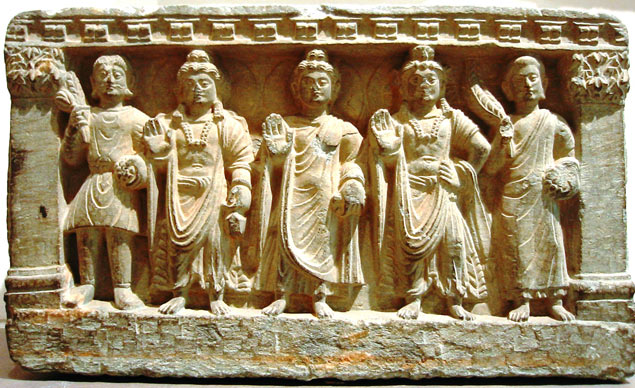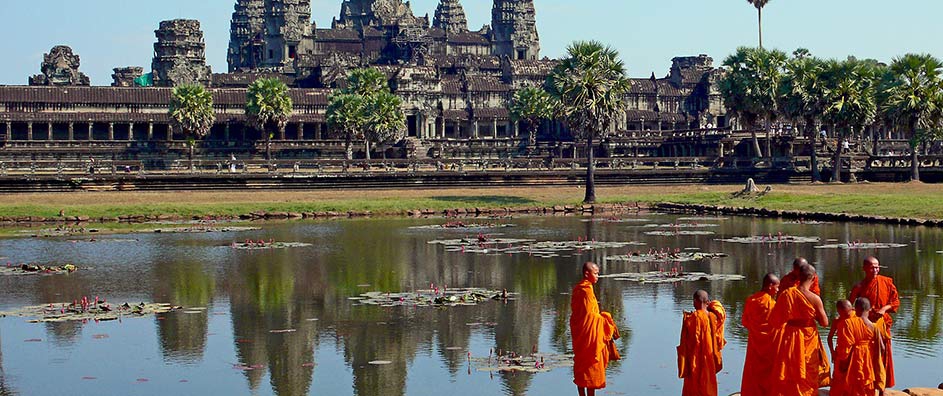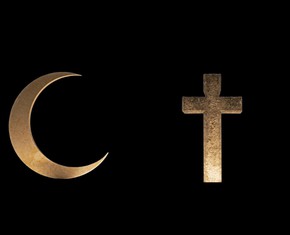The views expressed in our content reflect individual perspectives and do not represent the authoritative views of the Baha'i Faith.
Most historians understand that Buddhism has probably changed dramatically since Gautama Buddha founded his Faith 2500 years ago. Passed down through unreliable oral histories and built on understandings based on those histories, modern Buddhism may or may not bear any resemblance to what Buddha originally taught.
Nevertheless, what we do know about Buddha’s teachings, given originally to largely illiterate societies, came in the form of structures that would make memorization easier. For example, there are:
- One dharma: teaching.
- Two spiritual pathways: one for lay-people and one for monks.
- Three baskets of scripture: one for the rules for monks, one for the discourses, and one commentary (the Abhidhamma).
- Three dharma seals: the teachings on impermanence, non-self, and nirvana.
- Four noble truths: life is full of suffering, the cause of suffering is attachment, suffering can end, the way to end it is the Buddha’s way.
Buddhism also has five mental formations and five remembrances; six types of consciousness, seven factors of enlightenment, an eightfold path, twelve links of dependent origination, eighteen realms (dhatus) and many, many other associations built on numbers. These simple mnemonics give us reason to believe that the basics of the Buddha’s teachings have been preserved.
However — the immensity of Buddhist scripture, the different versions in different languages, the different interpretations, and the widely different practices have led to many different forms of Buddhism. The current primary distinction, between Theraveda and Mahayana Buddhism, doesn’t begin to describe the many divisions and schools in each major form. Further, both Theraveda and Mahayana Buddhism arose hundreds of years after the Buddha and continued to evolve. Given this, it is hard to categorically characterize differences, save to say that the Theraveda branch is more conservative in that it accepts fewer scriptures, but includes the whole of the Pali canon; while the Mahayana branch accepts a few more scriptures, including some very well known sutras such as the Lotus Sutra, Heart Sutra, Diamond Sutra and Amitabha Sutra. In addition, Mahayana Buddhists in general also revere more Bodhisattvas (enlightened beings who take on the task of saving humanity). Countries to the South and East of where the Buddha taught in northeast India, tend to have more Theravedists; countries to the north and far east have more Mahayana Buddhists. And of course many contemporary Buddhists, regardless of their sect, now see their faith very differently than it was originally intended:

Mahāyāna Buddhist triad 2nd–3rd century CE in Gandhāra, Pakistan
The founder of Buddhism was a wonderful soul. He established the Oneness of God, but later the original principles of His doctrines gradually disappeared, and ignorant customs and ceremonials arose and increased until they finally ended in the worship of statues and images. – Abdu’l-Baha, Some Answered Questions, p. 165.
Understanding a few of the problems in Buddhist history and scripture, we can now examine the questions before us, starting with the most basic: Is Buddhism theistic, i.e. does it believe in God? To answer that question, the Buddha’s ministry should be seen in historic perspective. When Buddha appeared the Vedic religion in India was in a period of decline. The Buddhist narrative says that the privileged caste of priests, the brahmins, had become corrupt, knowing little of the true spirit of religion, which made them unable to teach others the path to God. A disciple of the Buddha, Vasettha, commented on this situation to the Buddha, who replied:
Then you say, too, Vasettha, that the brahmins [priests] bear anger and malice in their hearts, and are sinful and uncontrolled, whilst Brahman [God] is free from anger and malice, and sinless, and has selfmastery. Now can there, then, be concord and likeness between the brahmins and Brahman?
Note that the Buddha does talk about God (Brahman) and is concerned about correctly reflecting God’s light. But the Buddha lived at a time when people were drowning in a sea of different doctrines about God and the different rights of priests as intermediaries. He saw clearly that adding to the intellectual and religious fray would not help rescue humanity from their suffering. Instead, his beautiful and profoundly spiritual Faith asks its followers, and all of us, to focus on our inner spiritual journey.
You May Also Like
Comments

















The name Brahmān originates in the historical Vedic religion, in which Brahmān appears as the creator of the universe. Early Buddhist texts describe several different Brahmāns coexisting in the same universe; some of them think they are "all powerful" creators of the world, but they are corrected by the Buddha. The myths, characters, and functions of these Brahmāns are distinct from those of the Vedic Brahmā. However, at least one of the Buddhist Brahmāns is identified as being ...the object of worship of pre-Buddhist brahmins. The Buddha described the Vedic Brahmān as a misunderstanding, or mistaken remembrance, of one or more of the Buddhist Brahmās, as explained in the Brahmajāla sutta (Digha Nikaya 1).
There is no identity between the Buddhist Brahmāns and the Hindu conception of brahman as an all-encompassing divine force.
There are at least four ways of interpreting the term Brahmān. It may refer to:
Any of the deities of the Ārūpyadhātu or of the Rūpadhātu
Any of the deities of the nine lowest worlds of the Rūpadhātu, from Śubhakṛtsna to Brahmapāriṣadya.
Any of the deities of the three lowest worlds of the Rūpadhātu
A Mahābrahmā, one of the highest deities of preceding group.
In the sense of "a being of the Rūpadhātu", the term Brahmā may be related to Brahmavihāra, a term referring to the meditative states achieved through the four Rūpajhānas, which are shared by the inhabitants of the Rūpadhātu.
The old Upanishads largely consider Brahman in the masculine gender (Brahmā in the nominative case, henceforth "Brahmā") to be a personal god, and Brahman in the neuter gender (Brahma in the nominative case, henceforth "Brahman") to be the impersonal world principle. They do not strictly distinguish between the two, however. The old Upanishads ascribe these characteristics to Brahmā: first, he has light and luster as his marks; second, he is invisible; third, he is unknowable, and it is impossible to know his nature; fourth, he is omniscient. The old Upanishads ascribe these characteristics to Brahman as well. In the Buddhist texts, there are many Brahmās. There they form a class of superhuman beings, and rebirth into the realm of Brahmās is possible by pursuing Buddhist practices. In the early texts, the Buddha gives arguments to refute the existence of a creator.
In the Pāli scriptures, the neuter Brahman does not appear (though the word brahma is standardly used in compound words to mean "best", or "supreme"), however ideas are mentioned as held by various Brahmins in connection with Brahmā that match exactly with the concept of Brahman in the Upanishads. Brahmins who appear in the Tevijja-suttanta of the Digha Nikaya regard "union with Brahmā" as liberation, and earnestly seek it. In that text, Brahmins of the time are reported to assert: "Truly every Brahmin versed in the three Vedas has said thus: 'We shall expound the path for the sake of union with that which we do not know and do not see. This is the correct path. This path is the truth, and leads to liberation. If one practices it, he shall be able to enter into association with Brahmā." The early Upanishads frequently expound "association with Brahmā", and "that which we do not know and do not see" matches exactly with the early Upanishadic Brahman.
In the earliest Upanishad, the Brihadaranyaka Upanishad, the Absolute, which came to be referred to as Brahman, is referred to as "the imperishable". The Pāli scriptures present a "pernicious view" that is set up as an absolute principle corresponding to Brahman: "O Bhikkhus! At that time Baka, the Brahmā, produced the following pernicious view: 'It is permanent. It is eternal. It is always existent. It is independent existence. It has the dharma of non-perishing. Truly it is not born, does not become old, does not die, does not disappear, and is not born again. Furthermore, no liberation superior to it exists elsewhere." The principle expounded here corresponds to the concept of Brahman laid out in the Upanishads. According to this text the Buddha criticized this notion: "Truly the Baka Brahmā is covered with unwisdom."
The Buddha confined himself to what is empirically given. This empiricism is based broadly on both ordinary sense experience and extrasensory perception enabled by high degrees of mental concentration. (However it should be noted that amongst the customary epithets of the Buddha are the Pali terms 'lokuttara', meaning 'world-transcending', and also 'lokavidu', meaning 'knower of worlds' which are both quite incompatible with the notion of 'empiricism' as generally understood in current philosophy.)
The Buddhist woman's face broke into a wide smile and she said, "Yes, yes! The transcendent reality; the great life force."
I've had this issue of Buddhist atheism come up repeatedly and it almost always resolves itself in a setting aside of semantics and looking at what we can agree Buddha said. I discovered, too, that the sutra that most people have claimed says God doesn't exist actually says that the question of whether God exists is irrelevant (I believe that's a fairly precise wording). That, is an entirely different proposition ... with which I, as a Bahá'í, agree.